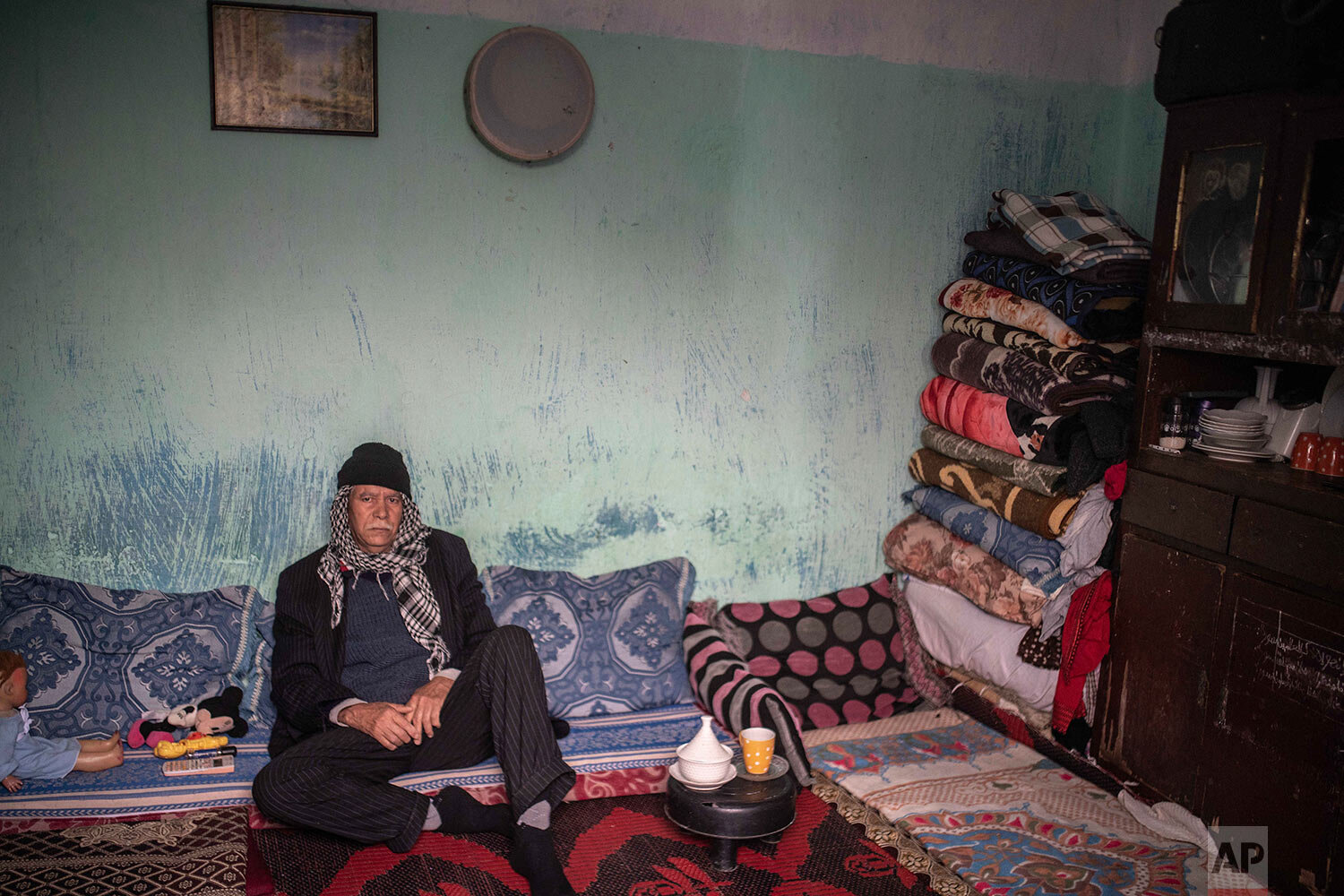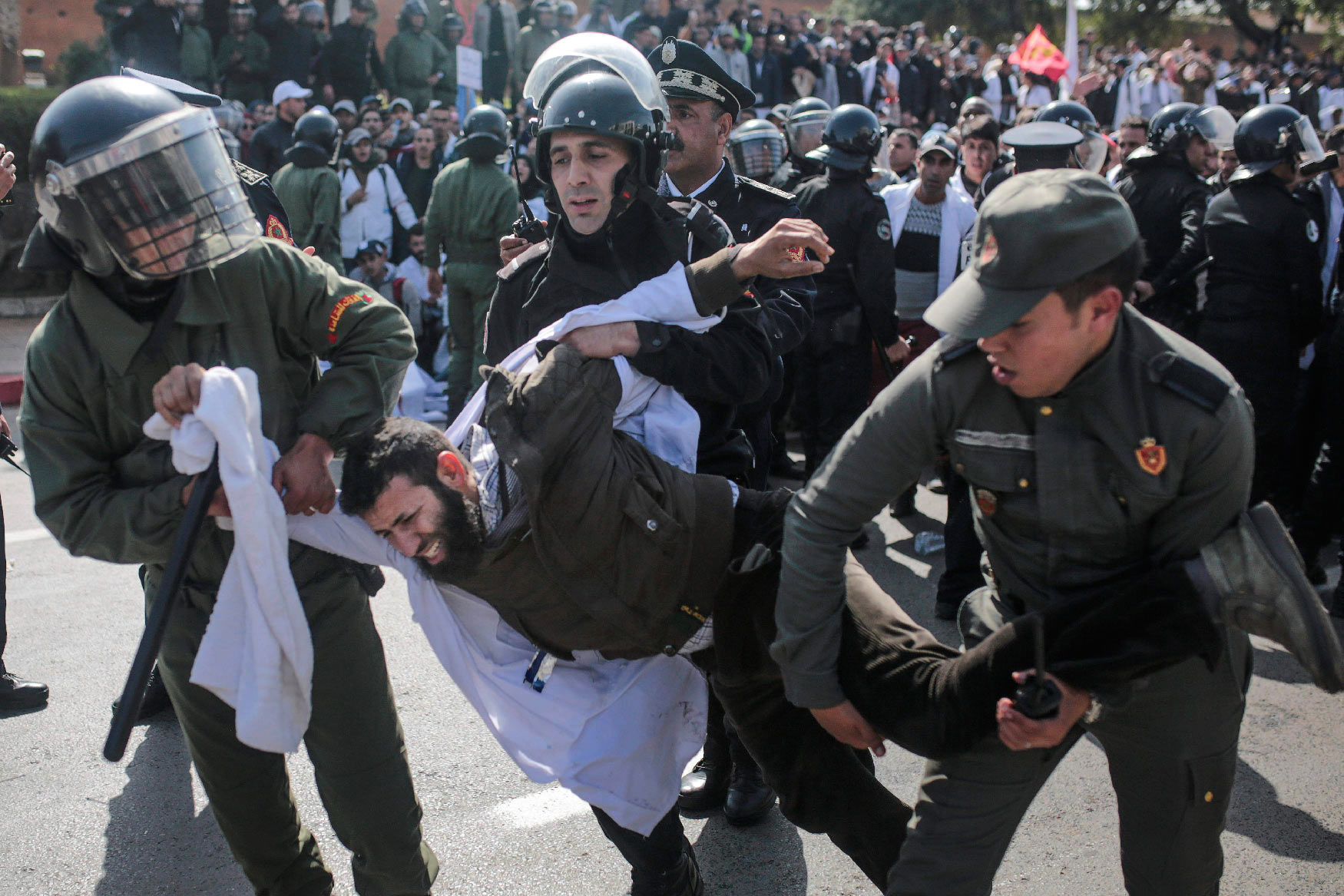Virus haunts the destitute living on the margins

In a housing complex in the Moroccan city of Sale, over 900 people live in crowded rooms without running water or an income to support them. While the North African country entered total lockdown in mid-March, self-isolation and social distancing are a luxury that families in this complex cannot afford.
Some families have lived in their room for 40 years, steadily filling it with children and grandchildren, with some rooms housing up to 10 people. Almost all are marginalized, and since the outbreak of COVID-19, those who had jobs – such as working in gas stations or selling small items on the streets - have been left with no way to make a living.
Like countries around the world, Morocco is facing the challenge of how to protect populations from the fast-spreading virus while not punishing the poor.
A man stands outside his room in an overcrowded housing complex in Sale, near Rabat, Morocco, March 25, 2020. (AP Photo/Mosa'ab Elshamy)
In early March, the Moroccan government began rolling out measures to stem the spread of the virus, culminating in the ongoing lockdown that has turned once bustling cities into ghost towns.
Borders, schools, shops, companies, cafes and mosques have closed. Movement between cities is restricted. Only one member of each household is permitted to leave in order to buy necessities, and those who work in essential jobs must have government-approved permission slips to show at checkpoints or risk facing up to three months in prison.
As the measures started to pinch vulnerable families, Morocco approved emergency support packages to people not registered in public or private sector jobs, ranging from $80 to $120. The fund supporting such measures was established by Moroccan King Mohamed VI, and saw mobilization by institutions, businesses and officials.
At the housing complex in Sale’s old medina, children hang around the communal courtyard and run through narrow alleyways. Families share one room where they wash clothes, and fill buckets of water at public fountains.
Volunteers disinfect a housing complex to prevent the spread of coronavirus in Sale, near Rabat, Morocco, March 25, 2020. (AP Photo/Mosa'ab Elshamy)
Volunteers from a local non-governmental organization have stepped in to help, visiting the residence to disinfect surfaces, trying to prevent an outbreak of the virus in this crowded corner of Sale.
Resident Abdelkader Gourmai has limited mobility and depends on his wife, Halima, who usually works as a cleaner or sells vegetables in the medina, or market. Gourmai, 68, said when the lockdown began, the couple started buying groceries on credit, but now even that option has dried up.
Kaddour El Miny used to sell water to shoppers in the medina. A job that brought in very little before the COVID-19 lockdown has now stopped entirely.
Ilyas, 61, lives with eight family members. “My sons can’t find jobs. We’re not poor; we’re destitute,” he said. “We don’t rely on savings or a salary. If we don’t go out to work one day, then we go to sleep hungry.”
Women hang clothes to dry in hallways and on walls, their belongings and hands touching the same surfaces.
Warda, a mother, poses with her son Mohamed and her daughter Jannat in their room in a housing complex in Sale, near Rabat, Morocco, March 25, 2020. (AP Photo/Mosa'ab Elshamy)
Warda, a mother of three, knows the risks, but sees no alternative. “I am scared for my children. I have to lock them indoors and stay with them, but how am I supposed to feed them?”
Teams of volunteers in hazmat suits from Mohamed El Gaid’s aid group Shabab el Mowatana have been visiting slums and densely populated buildings like this one to help clean. Local authorities supplied a room near a mosque where volunteers gather, store equipment and get water.
“We had to take the initiative and try to complement the government effort," El Gaid said. “Every effort is necessary.”
“We’re all from Sale and want to make a difference,” he added.
As the volunteers walk up through the tiny stairs of the complex, they’re received with relief and gratitude. People pray out loud for the workers as they disinfect walls and floors.
Residents hope that this will be enough to save them from a contagion they can’t risk facing.
Abderrazak Abdelhady, 66, sits in his room in an overcrowded housing complex in Sale, near Rabat, Morocco, March 25, 2020. (AP Photo/Mosa'ab Elshamy)
Younes and his wife, Ilham, pose for a photo with their children in their room in an overcrowded housing complex in Sale, near Rabat, Morocco, March 25, 2020. (AP Photo/Mosa'ab Elshamy)
Buckets and bowls are spread across the floor of a shared washing room for laundry in an overcrowded housing complex in Sale, near Rabat, Morocco, March 25, 2020. (AP Photo/Mosa'ab Elshamy)
Youths hang out in a courtyard of an overcrowded housing complex in Sale, near Rabat, Morocco, March 25, 2020. (AP Photo/Mosa'ab Elshamy)
Women gather in an overcrowded housing complex in Sale, near Rabat, Morocco, March 25, 2020. (AP Photo/Mosa'ab Elshamy)
Kaddour El Miny, left, sits with his family in a room in a housing complex in Sale, near Rabat, Morocco, March 25, 2020. (AP Photo/Mosa'ab Elshamy)
Volunteers disinfect an overcrowded housing complex to prevent the spread of coronavirus in Sale, near Rabat, Morocco, March 25, 2020. (AP Photo/Mosa'ab Elshamy)
Women and children gather in a housing complex in Sale, near Rabat, Morocco, March 25, 2020. (AP Photo/Mosa'ab Elshamy)
Kitchen utensils and shoes placed on a shelf inside a room that's part of an overcrowded housing complex in Sale, near Rabat, Morocco, March 25, 2020. (AP Photo/Mosa'ab Elshamy)
Ilias, 61, sit in his room in a housing complex in Sale, near Rabat, Morocco, March 25, 2020.. (AP Photo/Mosa'ab Elshamy)
A dog owned by one of the residents of a housing complex sits in his kennel in Sale, near Rabat, Morocco, March 25, 2020. (AP Photo/Mosa'ab Elshamy)
Kaddour El Miny, 55, poses with his equipment for selling water, which he can no longer use, in a housing complex in Sale, near Rabat, Morocco, March 25, 2020. (AP Photo/Mosa'ab Elshamy)
A volunteer disinfects an overcrowded housing complex to prevent the spread of coronavirus in Sale, near Rabat, Morocco, March 25, 2020. (AP Photo/Mosa'ab Elshamy)
A young girl returns with bread she bought for her family in a housing complex in Sale, near Rabat, Morocco, March 25, 2020. (AP Photo/Mosa'ab Elshamy)
Volunteers and residents walk outside the entrance of a housing complex in Sale, near Rabat, Morocco, March 25, 2020. (AP Photo/Mosa'ab Elshamy)
Text from AP News story AP PHOTOS: Virus haunts the destitute living on the margins by Mosa’ab Elshamy.










